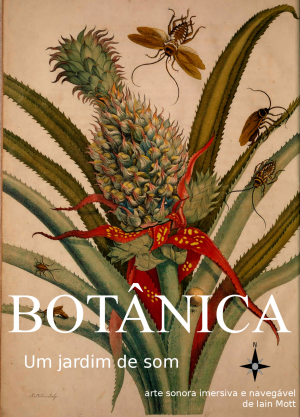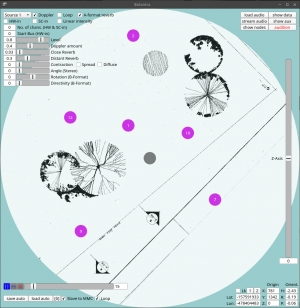
Iain Mott
Iain Mott is a sound artist, living in Brazil since 2007. He was a visiting professor in the Music Department at the University of Brasilia (UnB) from 2008 to 2011 and a lecturer (professor adjunto) in the area of voice and sound design in the Departamento de Artes Cênicas (theatre arts), UnB from 2012-2024. His sound installations are characterised by high levels of audience participation and novel approaches to interactivity. He has exhibited widely in Australia and at shows including the Ars Electronica Festival in Linz, Emoção Art.ficial in São Paulo and the Dashanzi International Art Festival and Multimedia Art Asia Pacific (MAAP) in Beijing. His most recent installation with Simone Reis O Espelho was exhibited at the Centro Cultural Banco do Brasil (CCBB) in Brasilia in the second half of 2012. Iain has received numerous awards and grants and has successfully managed innovative projects for almost 20 years. His GPS-based project Sound Mapping was awarded an Honorary Mention in the 1998 Prix Ars Electronica. In 2005 he was awarded an Australia China Council Arts Fellowship to work with the Beijing arts company the Long March Project. His work Zhong Shuo was created as part of the fellowship in collaboration with Chinese artists and was given 3rd prize in the UNESCO Digital Art Awards. The project has in addition been selected by MAAP for two further installations in Shanghai and Brisbane in 2006. Iain was artist in residence at the CSIRO Mathematical and Information Sciences in Canberra for 12 months in 1999/2000. The notion of collaboration between artist and audience has ongoing importance in Iain's work. His PhD from the University of Wollongong was supervised by Greg Schiemer and is entitled Sound Installation and Self-listening.
More information:
Petit Godot (título provisório para Assombros)
Botânica Poster
Mosca : Visão geral
Uma visão geral do software ambisônico Mosca. Para ouvir com fones de ouvido.
Tutorial de Vídeo de Mosca
Tutorial on using the GUI interface of the Mosca quark for SuperCollider. Please listen with headphones and please view in full-screen mode.
Mosca Video Tutorial
Tutorial on using the GUI interface of the Mosca quark for SuperCollider. Please listen with headphones and please view in full-screen mode.
Demonstração de Botanica
Para ouvir com fones de ouvido. Certifique-se de que os fones estejam orientados corretamente.
Botanica Software
Screenshot of Botanica software (2017). The listener is represented by the central grey dot. The pink dots are the virtual sound sources. As the listener moves through the garden, the map moves in the opposite direction to his or her path with the grey dot remaining at the centre. The pink dots may be stationary on the map or may have their own animated trajectories. As the listener moves, the sound sources move relative to the sliding map. Like real sounds, the virtual sound sources become quieter with distance and they become inaudible once they pass outside the circular boundary of the map. The software is used to perform the mapping of sounds in advance of public interaction and to deliver the 3D sound experience in the field. The software display is not visible to participants.
Mosca Audio Demo for Headphones
This audio demonstration of Mosca involves the spatialisation of mono, stereo and B-format material. As well as using music and B-format recordings made by Iain Mott, it also contains 3 B-format recording by John Leonard of geese, a Chinook helicopter and of the Stanbrook Abbey Choir. These recording by John are presented here with kind permission. Other recorded sounds include those of monks in the Luohan Temple in Chongqing, China, frogs in São Jorge, Goiás in Brazil, a matchbox and an original recording of Sputnik 1 made by Roy Welch, reproduced with Roy's permission.
Please listen with headphones and ensure that the left and right channels are positioned correctly.








